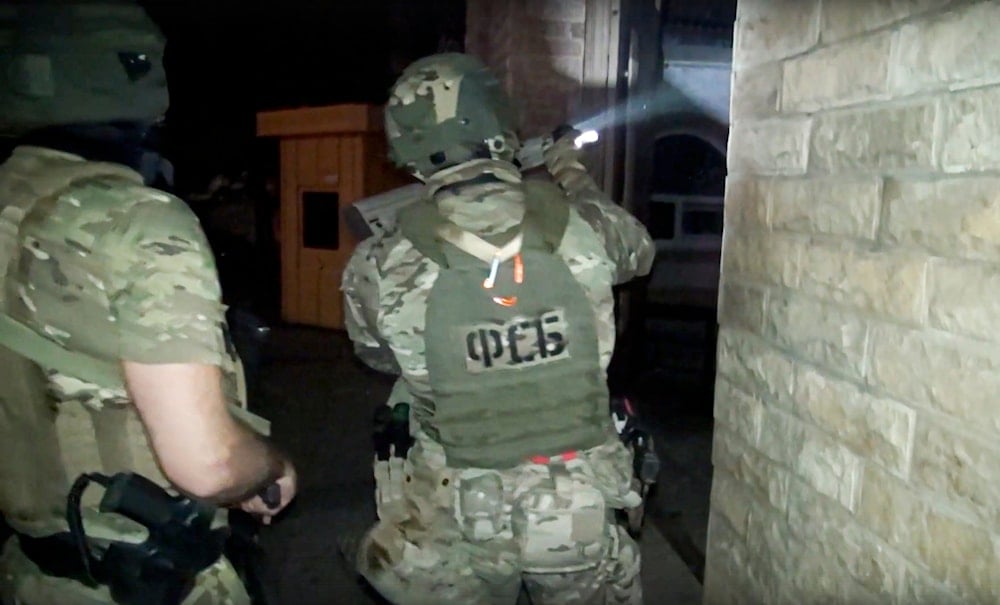FSB detains man over April car-bomb killing of Russian general
Russian security services say Ukrainian intelligence orchestrated the April car-bomb attack that killed Lt. Gen. Yaroslav Moskalik, with an arrested suspect also accused of spying on defense personnel and infrastructure.
-

In this photo taken from a video released by the National Antiterrorism Committee on Monday, June 24, 2024, FSB officers conduct a counter-terrorist operation in the Republic of Dagestan, Russia. (AP)
Russian authorities say they have detained a Russian citizen implicated in the murder of Lt. Gen. Yaroslav Moskalik, deputy chief of the main operational directorate of the Russian Armed Forces’ General Staff, which Russian officials say was orchestrated by Ukrainian special services in April 2025.
The Federal Security Service (FSB) reported on Saturday that the suspect, born in 1976, was arrested in Russia’s Saratov Region.
According to the FSB, he delivered a homemade explosive device to the Moscow Region under instructions from Ukrainian operatives, resulting in the April 25 car-bomb killing of Moskalik in Balashikha.
The agency said the detainee also collected and passed information to Ukrainian intelligence on Russian Aerospace Forces personnel, defense enterprise staff, and critical infrastructure in the Saratov Region. Investigators claim he had contacted a Ukrainian officer via WhatsApp in July 2023 and agreed to carry out the attacks.
In a video released by the FSB, the suspect reportedly admitted to monitoring Moskalik and delivering the bomb, stating that Ukrainian services had also planned attacks on defense industry employees in Saratov.
The Russian Investigative Committee previously reported that Ignat Kuzin was arrested by Moscow’s Basmanny Court for carrying out the attack. He was reportedly promised $18,000 to plant the explosives under orders from a Ukrainian Security Service curator.
Russia's FSB foils Ukrainian 'terrorist attack' on Crimean bridge
Earlier this week, Russia’s Federal Security Service (FSB) announced that it had prevented a terrorist attack plotted by Ukrainian special services against the Crimean Bridge. The agency intercepted and neutralized an electric Chevrolet Volt rigged with a powerful improvised explosive device.
According to the FSB, the car bomb was intended to cross into Russia’s southern Krasnodar Region from Georgia. It had been transported from Ukraine via multiple third countries. Ukrainian operatives planned to load the vehicle onto a transporter truck before handing it off to another individual who would unknowingly drive it to Crimea via the Crimean Bridge, becoming an unwitting suicide bomber.
"A vehicle with a high-power improvised explosive device arrived in Russia from Ukraine in transit through a number of countries. It crossed the Russian-Georgian border at the Verkhniy Lars international checkpoint in the Republic of North Ossetia-Alania and was supposed to proceed to Krasnodar Krai on a car transporter driven by a private driver," the FSB statement said.
Per the FSB, the Ukrainian plot was to deliver the explosive-laden vehicle to another diver "who was supposed to ride in it to Russia’s Crimea via the Crimean Bridge and become an unwitting suicide bomber."
The Chevrolet Volt was reportedly packed with approximately 130kg of Finnish-made explosives. The vehicle’s movement through various countries demonstrates the complexity and covert nature of the operation, which Russia attributes directly to Ukrainian special services.
FSB officers were able to identify and detain all individuals involved in the vehicle's transport and preparation before the car could reach its target.
Read more: Zelensky, Trump to discuss path to peace in Ukraine amid ongoing war
FSB identifies suspects and thwarts attack
“Despite all the trickery by the Ukrainian terrorists, the FSB officers managed to promptly uncover their plans, identify and defuse the explosive device… and also detain all those involved in its delivery to the territory of our country,” the agency said in a statement.
Interrogation of the driver, who was paid $2,500 to deliver the car to Crimea, revealed that he was aware of working for Ukraine, though he claimed ignorance about the presence of explosives.
This is the second known Ukrainian attempt to target the 19-kilometer-long Crimean Bridge in 2025. In April, Belarusian security services intercepted a minivan loaded with over 500 kg of synthetic explosives. That vehicle was also bound for the same strategic bridge connecting Krasnodar Region and Crimea.
Read more: Europe’s arms industry booms as war production triples: FT

 4 Min Read
4 Min Read











